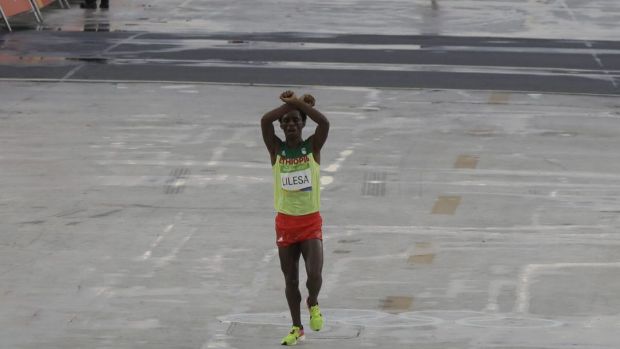-
Tips for becoming a good boxer - November 6, 2020
-
7 expert tips for making your hens night a memorable one - November 6, 2020
-
5 reasons to host your Christmas party on a cruise boat - November 6, 2020
-
What to do when you’re charged with a crime - November 6, 2020
-
Should you get one or multiple dogs? Here’s all you need to know - November 3, 2020
-
A Guide: How to Build Your Very Own Magic Mirror - February 14, 2019
-
Our Top Inspirational Baseball Stars - November 24, 2018
-
Five Tech Tools That Will Help You Turn Your Blog into a Business - November 24, 2018
-
How to Indulge on Vacation without Expanding Your Waist - November 9, 2018
-
5 Strategies for Businesses to Appeal to Today’s Increasingly Mobile-Crazed Customers - November 9, 2018
Ethiopian runner Feyisa Lilesa stages protest against his country’s government
On Sunday, Lilesa, who came second to Kenyan favorite Eliud Kipchoge in Rio, crossed his arms as he finished the marathon in protest against the Ethiopian government’s crackdown on political dissent.
Advertisement
Feyisa Lilesa, the Olympic men’s marathon silver medallist, “could face death” after displaying support for a government protest in Ethiopia as he crossed the finish line.
‘Feyisa Lilesa faces persecution if he goes back to Ethiopia and he has made a decision to to seek asylum, ‘ the campaign reads. If I go back to Ethiopia maybe they will kill me, or put me in prison.
Lilesa was protesting the Ethiopian government’s killing of hundreds of the country’s Oromo people – an ethnic majority that has long complained about being marginalized by the country’s government.
Lilesa said he wanted to draw attention to the government’s ongoing persecution of the Oromos, but he feared that his protest had put himself into such danger that he can’t go home.
He told reporters after the race: “I was protesting for my people”.
“Oromo is my tribe. I am anxious to ask my relatives to talk in prison – if you talk you get killed”. In a photograph seen worldwide, 26-year-old Lilesa stands with his arms crossed over his head – a gesture of defiance used by Oromos in recent months. It is meant to symbolize being handcuffed by security forces.
“Lelisa won’t face any problem due to his political stance”, government spokesman Getachew Reda state-controlled Fana radio on Monday. “After all, this is an athlete who secured a silver medal for his country”.
It’s unclear if Lilesa’s political gesture will affect his Olympic medal.
The “x” symbol is used by people across the world, including in NY in January, demonstrating against deaths at Oromo protests…
Advertisement
The Oromo make up at least a third of Ethiopia’s 100 million people. Other issues -the expansion of the municipal boundary of the capital, Addis Ababa, into Oromia, land grabbing and the eviction of farmers, and the brutal repression of protestors – fed the fire, according to Human Rights Watch and other independent monitors. The plan has been abandoned, but demonstrations calling for wider freedoms have continued.





























